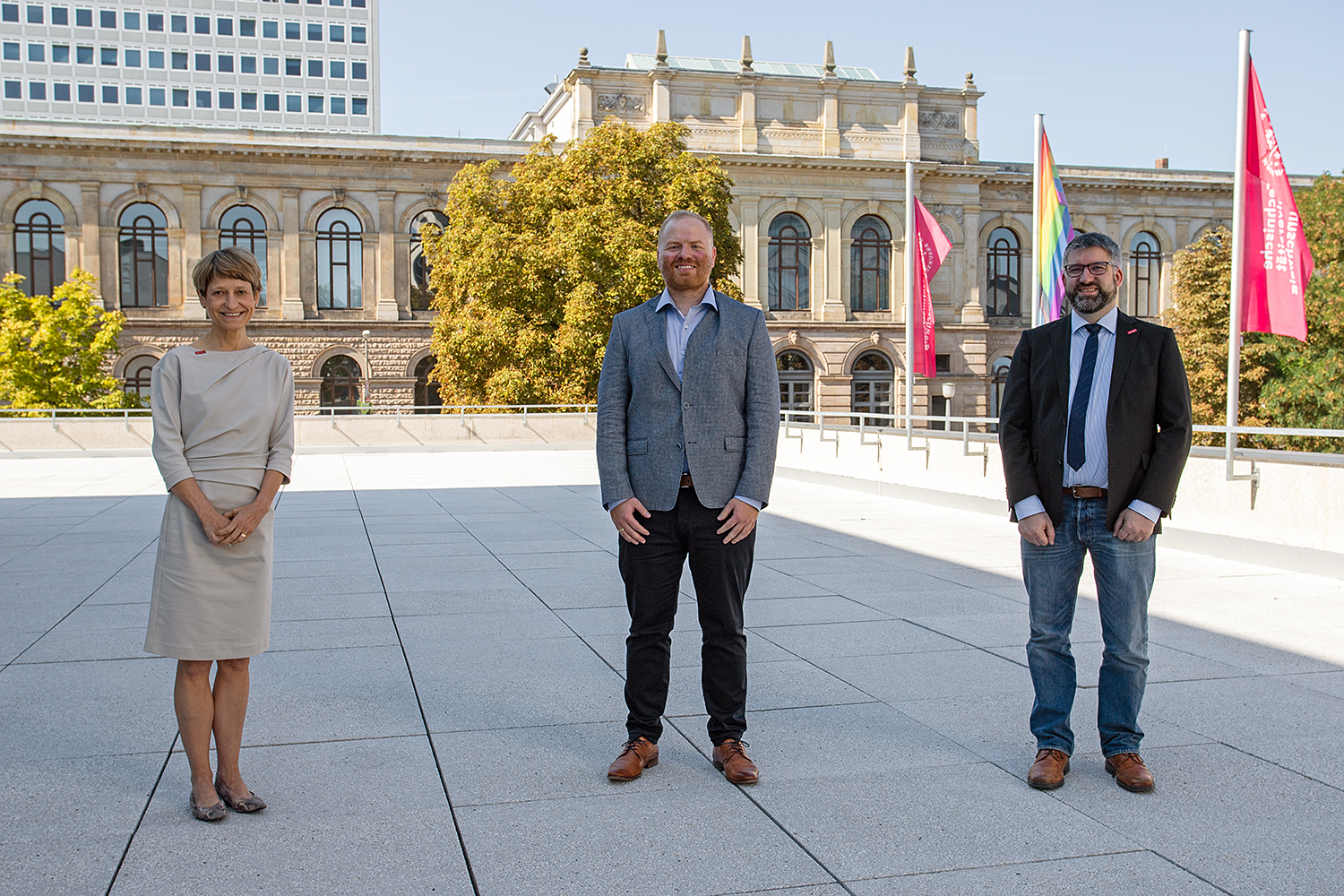Using AI to Design Specific Molecules in the Computer Appointment of Jonny Proppe as Junior Professor for Computer-Aided Materials Design
New appointment at the Institute of Physical and Theoretical Chemistry: Since October 1, 2021, Jonny Proppe has been teaching and researching as an assistant professor in the subject “Computational Materials Design for Chemical Energy Conversion”. There, he deals with quantum chemistry, data science and artificial intelligence (AI). Using these and many other new methods, he looks very closely at molecules and tries to predict how their structure and properties are related. If molecules can be reliably described in this way, the search can be accelerated – for example, for chemical compounds that can convert the greenhouse gas carbon dioxide into a harmless substance.

President Prof. Angela Ittel, Prof. Jonny Proppe and Dean Prof. Christoph Jacob. Bildnachweis: Max Fuhrmann/TU Braunschweig
Professor Proppe, have you arrived well at the TU Braunschweig?
The smooth process from the appointment to the organisation of the equipment as well as the friendly welcome by my colleagues have made my start at TU Braunschweig very easy. In the current winter semester, I would now also like to get to know the students. I am looking forward to many interesting encounters!
Why did you choose the TU Braunschweig?
The junior professorship focuses on the topics of climate change and digitalisation. Established methods of theoretical chemistry, in particular quantum chemistry, as well as modern methods of data science, especially artificial intelligence (AI), play a central role here. I have been able to gain valuable experience in both areas at renowned universities such as ETH Zurich and Harvard University, which I would like to build upon here. I am pleased that TU Braunschweig is an innovation-friendly institution that offers me and the future members of my research group the opportunity to conduct research on the pressing issues of our time. In addition, the newly established Master’s program in Data Science offers an ideal opportunity to represent the interdisciplinary work of our group in teaching.
What exactly do you deal with in your research?
Molecules play a major role in almost all areas of our lives. Every molecule has a number of physical and chemical properties that can be traced back to its structure, i.e. the spatial arrangement of atomic nuclei and electrons. In theoretical chemistry, the relationship between the structure and the properties of molecules is investigated. Since the calculations required for this purpose are time-consuming and resource-intensive, I am investigating AI algorithms and applying them to chemical problems. AI enables us to make reliable predictions about the properties of molecules for which no data is (yet) available. In this way, the process of gaining knowledge can be accelerated considerably.
What will you be dealing with at the TU Braunschweig?
It gets even more interesting when we reverse the problem and ask for a molecule with a set of desired properties. If questions of this kind could be answered systematically, we could design molecules in silico – i.e. in the computer – for example a catalyst for the reduction of carbon dioxide, a much-discussed chemical reaction with regard to climate change. In the coming years, our group will devote itself to the development of methods in the fields of AI and quantum chemistry in order to come one step closer to the targeted design of molecular catalysts and materials.
What made you decide to do research in this area?
During my chemistry studies, I quickly became interested in theoretical concepts because they allow an abstract perspective on chemistry. I am still attracted by the idea of recognizing general patterns that can be applied to new, still unknown examples. In 2015, I finally got to know AI methods from the field of machine learning that work according to exactly this principle – and are far superior to us humans in recognizing patterns. It was clear to me then: this is what I want to do. I find it fascinating to make predictions about the structure and properties of chemical compounds that can eventually be validated experimentally or with the help of simulations. A theoretical chemistry that is not only hypothetically predictive but can provide answers on a relevant time scale, that is my vision.
A look at the future: What are your plans?
The methods we have developed offer a promising approach to solving pressing societal problems in a time- and resource-saving manner. Furthermore, these methods, which we make publicly available, can be used by researchers in countries and regions with rather low research budgets. We are pursuing a very sustainable research approach here. A key aspect is the use of reliable data, which is currently not available to a sufficient extent. Generating and making this data available in public databases is therefore an important goal on our agenda. In addition, we would like to introduce our methods into the curricula of chemistry and data science, thus expanding them with a promising tool for the future.
What advice do you have for young researchers?
The professional deepening is effectively a byproduct of the doctorate. Do not forget to also think outside the box. Always be curious, listen attentively to people with both similar and distinct backgrounds and ask yourself how you can combine a wide variety of topics with your expertise. Always keep yourself up to date and read the literature on topics that are relevant or otherwise interesting to you. Not only will this allow you to do cutting-edge research but having a broad portfolio will certainly also increase your career opportunities.
